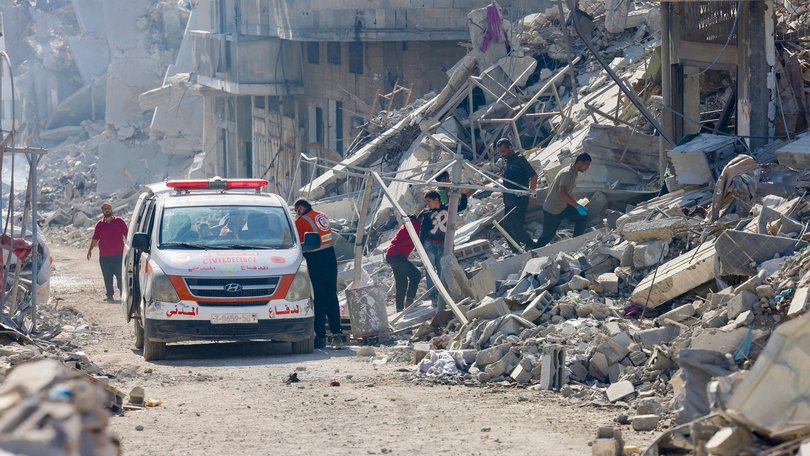Turkey deploys personnel to find hostage bodies in Gaza rubble
Turkey has deployed dozens of disaster relief specialists to help search for bodies under the mountains of rubble in Gaza.

Turkey has deployed dozens of disaster relief specialists to help search for bodies under the mountains of rubble in Gaza, as Donald Trump fired a warning at Hamas over a spate of recent killings in the territory.
The US President characterised the killings as a breach of the ceasefire deal he spearheaded, under which the Palestinian militant group returned its last 20 surviving hostages to Israel.
Mr Trump had appeared to call for patience when it came to the bodies’ return - insisting Hamas was “actually digging” for hostages’ remains - but later expressed frustration on Thursday, local time.
Sign up to The Nightly's newsletters.
Get the first look at the digital newspaper, curated daily stories and breaking headlines delivered to your inbox.
By continuing you agree to our Terms and Privacy Policy.“We will have no choice but to go in and kill them,” he warned on social media after Hamas fighters were captured on video in recent days executing members of rival groups in the Palestinian territory.
Mr Trump told reporters later: “Somebody will go in. It’s not going to be us.”
Hamas says it has also handed back all the bodies of deceased captives it can access but the bodies of 19 more are still unaccounted for and believed to be buried under the ruins alongside an untold number of Palestinians. By Thursday, Hamas had returned 10 bodies to Israel, most of them of former hostages.
The Palestinian militants stressed their “commitment” to the ceasefire deal with Israel, and that they want to return all the remaining bodies of hostages left in Gaza.
But it said in a statement that the process “may require some time, as some of these corpses were buried in tunnels destroyed by the occupation, while others remain under the rubble of buildings it bombed and demolished”.
Turkey has sent staff from its disaster relief agency to help in locating the bodies but the families of the dead have fumed at Hamas’s failure to deliver their loved ones’ remains.
The main campaign group advocating for the hostages’ families demanded Thursday that Israel “immediately halt the implementation of any further stages of the agreement as long as Hamas continues to blatantly violate its obligations regarding the return of all hostages and the remains of the victims”.
Prime Minister Benjamin Netanyahu reaffirmed his determination to “secure the return of all hostages” after his defence minister warned on Wednesday that Israel “will resume fighting” if Hamas failed to do so.
Mr Trump’s 20-point plan for Gaza calls for renewed aid provision, with international organisations awaiting the reopening of southern Gaza’s Rafah crossing in the hope it will enable a surge of supplies.
Israeli Foreign Minister Gideon Saar said on the sidelines of a summit in Naples that preparations were being made for the strategic crossing, and that he “hoped” it would reopen Sunday, Italian news agencies reported.
Israel, however, said earlier on Thursday that the crossing would only be open to people, not aid, and Saar did not appear to elaborate, according to the reports.
The humanitarian situation has been dire in Gaza throughout the war, with the UN declaring famine in parts of the north in August.
The World Health Organization has warned that infectious diseases are “spiralling out of control”, with only 13 of the territory’s 36 hospitals even partially functioning.
“Whether meningitis... diarrhoea, respiratory illnesses, we’re talking about a mammoth amount of work,” Hanan Balkhy, regional director for the UN health body, told AFP in Cairo.
Israel returned the bodies of 30 Palestinians to Gaza on Thursday, the territory’s health ministry said.
Under the ceasefire deal, Israel was to turn over the bodies of 15 Palestinians for every deceased Israeli returned.
For many in Gaza, while there was relief that the bombing had stopped, the road to recovery felt impossible, given the sheer scale of the devastation.
“There’s no water -- no clean water, not even salty water, no water at all. No essentials of life exist -- no food, no drink, nothing,” said Mustafa Mahram, who returned to Gaza City after the ceasefire.
“As you can see, all that’s left is rubble.”
